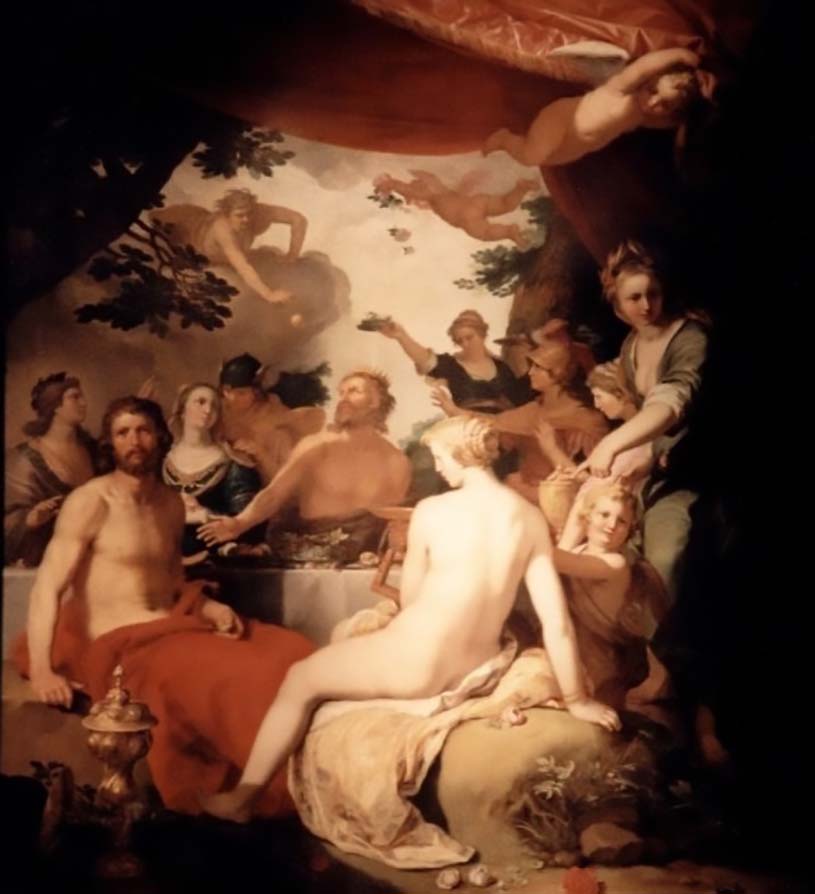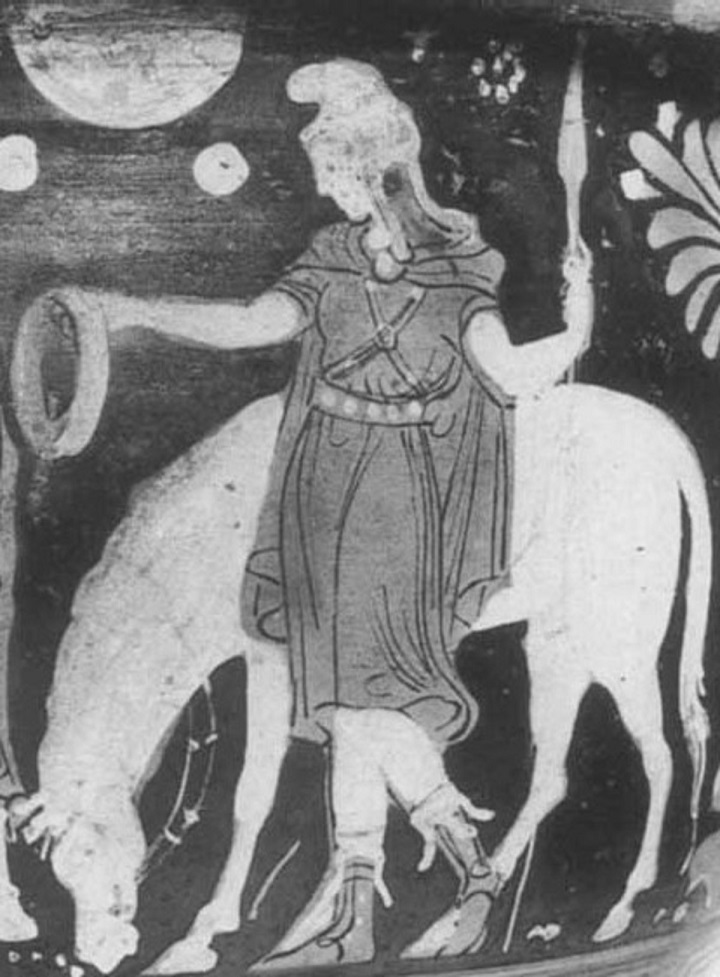Astydameia
Astydameia (Ancient Greek: Ἀστυδάμεια, derived from ἄστυ, "town", and δαμάω, "to tame") is a name that was given to five different figures in Greek mythology.
The first Astydameia, also known as Hippolyte, was the wife of Acastus, king of Iolcus. It was Acastus who absolved Peleus of the murder of King Eurytion. Astydameia fell for Peleus, but he rejected her.
So, she sent a message to Peleus' wife, Antigone, falsely claiming that her husband would marry Sterope, the daughter of Acastus. As a result, Antigone committed suicide.
Afterwards, Astydameia told her husband that Peleus tried to rape her, so Acastus took Peleus on a hunting trip where he was left unprotected during an attack by centaurs (specifically: Acastus would abandon Peleus upon the mountain, unarmed, whilst Peleus slept, believing that the wild centaurs on the mountain would kill Peleus).
Peleus managed to survive thanks to the help of Chiron and Hermes.
Peleus would return to Iolcus at the head of an army, when he was joined by Castor and Pollox, and Jason. Peleus now sought revenge upon the woman who had caused his wife to die.
Iolcus would fall to Peleus, and having caught Astydamia, the Queen of Iolcus was killed, with body quartered. Peleus then led the army between the dismembered limbs.
Some say of Astydamia’s husband, Acastus, being killed at the same time, though others tell of him remaining king for a while longer.
Another Astydameia was a lover of Heracles, with whom she had a son, Ctesippus.
The other three figures by the same name had minor roles in Greek mythology; one was the daughter of Pelops and Hippodamia; the other was the sister of Pylades; and the third was the mother of Lepreus.
Overall, in Greek mythology, Astydameia refers to the following figures:
Astydameia, daughter of Cretheus (also known as Hippolyta), was the Queen of Iolcus and wife of Acastus. Her husband purified Peleus of the murder of King Eurytion of Phthia. Astydameia fell in love with Peleus but he scorned her. Bitter, she sent a messenger to Antigone, Peleus' wife, to tell her that Peleus was to marry Acastus' daughter, Sterope; Antigone hanged herself.
Astydameia then told Acastus that Peleus had tried to rape her. Acastus believed the false accusations and tried to take revenge in Peleus by taking him on a hunting trip and leaving him unprotected as a group of Centaurs attacked. Peleus escaped death with the help of Chiron and Hermes; he pillaged Iolcus and dismembered Astydameia, then marched his army between the rended limbs.
Astydameia, daughter of Pelops and Hippodamia. She married Alcaeus and had children by him: Amphitryon, Anaxo, and Perimede. In other accounts, the wife of Alcaeus was named Hipponome, daughter of Menoeceus or Laonome, daughter of Guneus.
Astydameia, daughter of Phorbas and mother of Lepreus by Caucon, son of Poseidon. She persuaded Heracles to reconcile with her son, who had previously advised Augeas to cast Heracles in bonds.
Astydameia, mother of Ctesippus by Heracles. In one source, she is the daughter of Amyntor. Another account makes her the daughter of Ormenus, king of Ormenion. Heracles, the same source relates, wooed her, but Ormenius would not marry her to him since Heracles was already married to Deianira. Heracles then led a war against Ormenius, killed him and took Astydameia by force. Astydameia (or Astygeneia) is also an alternate name for Astyoche, daughter of Phylas, who bore Heracles a son Tlepolemus (Tlepolemus was the leader of the Rhodian forces in the Trojan War).
Astydameia, was briefly mentioned by a scholiast on Euripides as the daughter of Strophius and Cydragora and sister of Pylades.

Sources
Pindar, Nemean Ode 4.54 (88) with scholia
Scholia on Apollonius Rhodius, Argonautica, 1. 224
Scholia on Aristophanes, Clouds, 1063
Pseudo-Apollodorus, Bibliotheca 3.13.1-3 & 7
Pseudo-Apollodorus, Bibliotheca 2.4.5
Pausanias, Graeciae Descriptio 8.14.2
Aelian, Varia Historia 1.24
Pseudo-Apollodorus, Bibliotheca 2.7.8
Diodorus Siculus, Bibliotheca historica 4.37.
Diodorus Siculus, Bibliotheca historica 4.37.4
Pindar, Olympian Ode 7.24, with the scholia, in which Pherecydes (fr. 80 Fowler) is cited for the alternative name "Astygeneia".
Scholia on Euripides, Orestes, 33
"Greek Mythology"
"Wikipedia"













